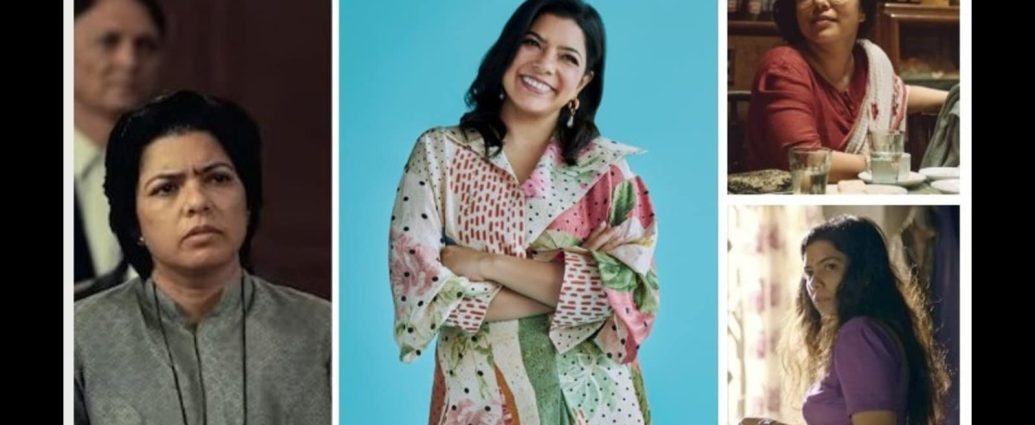In Episode 1 of Trial by Fire, Neelam Krishnamoorthy has just heard of the blaze at the Uphaar cinema hall. She and her husband rush to the site. Their two children are watching a movie there with a friend. They arrive to chaos, traffic, crowds of onlookers, policemen, and firefighters.
As she jostles through it all, she doesn’t shed a tear or say more than a few words. But she’s barely breathing. In every gesture is sheer desperation. Over the next few days, as she cremates her two children in silent shock, then hears that the doors of the theatre were locked from the outside (to keep out people who didn’t have tickets), the grief crystallises into anger. And she begins her legal battle.
For Rajshri Deshpande, it has been a gruelling and rewarding experience, helping to tell this story (based on a book by Neelam and her husband, Shekhar Krishnamoorthy). The smiling, optimistic 40-year-old put on weight, changed her gait, channelled whatever she could understand of Neelam’s complex emotions, and became her.
Deshpande is now revelling in the reviews and allowing herself the space to recharge. “An actor can get empty if they work too much. It is a creative process and you go through different emotions. If you do too many projects, you won’t have time to create new emotions,” she says. “I believe that some actors’ emotions start to look the same in every film because they work too much — the same look, same crying, same anger. I want to look different in every project, because every human is different.”
Deshpande has been different in every project — as Subhadra, the wife of gangster Ganesh Gaitonde in Sacred Games (2018-19); as the Urdu writer Ismat Chughtai in Manto (2018); as Laxmi Gaude, the maid in Pan Nalin’s Angry Indian Goddesses (2015).
Trial by Fire has been her most challenging role. But to each part, Deshpande has brought a wealth of experience that comes from a varied life.
***
Deshpande grew up in drought-prone Nanded, watching her father struggle as an industrial zone took the family farm and he was forced to work as an accountant. “We were from a humble background. My parents worked very hard and believed that only education could get us out of poverty,” she says.
Her two elder sisters are a doctor and an engineer. “My parents wanted us all to have ‘proper professions’ like those. I thought law was the easiest so I picked that,” she says.
Deshpande moved to Pune to study law, promising to help pay for her stay there by working part-time. She found a job with an advertising agency. “I became focused on making money and was not growing creatively. I got tired. I began wondering what I was doing with my youth. I had fought and found my footing, but I was so unhappy,” she says. She moved to Mumbai, which represented hope and possibility. And she began to think about her first loves: theatre, dance, the performing arts.
“I was never shy,” Deshpande says. “If I was asked to act or dance, I was always happy to. When you grow up, it is somehow assumed that you will leave it all behind, but I realised that performance is my joy. I was never afraid to deconstruct my life.”
Deshpande decided to enrol in a film school and picked Whistling Woods. “It was two years of having fun and making friends. Film school never leads to work, but it gives you a foundation,” she says. “I met Naseer Sir (Naseeruddin Shah) and started working backstage with his theatre group, Motley. I learnt a lot, like Eklavya, by watching from afar.”
She’s proud of how she’s grown through a range of roles, lining up and auditioning for each one. “Through merit I have made my space,” Deshpande says. “I want the respect that comes from being genuine, from working on my craft.” What motivates her is not wealth or fame. She’s determined to not lose sight of the goal again. “The whole reason I chose this field was to find joy.”
***
Some of that joy comes from distant places. Between acting assignments, Deshpande works with her NGO, Nabhangan Foundation, to help build and support schools, rainwater harvesting pits and health camps in drought-prone Marathwada.
“After Sacred Games ,I went away for two years, to build our school in Pandhari village, Aurangabad district. I chose to work there rather than do more of the same kinds of roles here.”
Perhaps eventually her two worlds will meet, in stories about rural Maharashtra. She has studied under Iranian filmmaker Mohsen Makhmalbaf, enrolled in a mentorship programme conducted by him and composer AR Rahman. “There are lots of stories inside me about the hinterland, and I feel that will be my space.”
Playing Neelam has reminded her of how important it is to fight. “So much needs to be done. If we don’t talk about change, it will never happen,” Deshpande says. “As a character says in the show, ‘Badla nahin badlav laana hai (The aim is not revenge, it’s change)’.”
She hasn’t signed a new film or web project yet. “I’m going slow. There are production houses who cast actors based on how many Instagram or YouTube followers they have. That can’t be my area. I am not in a hurry. I will do one good project a year, travel, go to the villages and build more schools.” Right now, she’s blank, Deshpande adds. It’s a blank that comes from stepping away, wiping the slate clean. “I like to be that way. I like to start, each time, from zero.”
(Rajshri Deshpande profile image by @chandrahas_prabhu; outfit: @gazalguptacouture; jewellery: @goldenwindow, @ascend.rohank; makeup: @richellefernandes; hair: @pinkyroy9467; style by: @who_wore_what_when)
